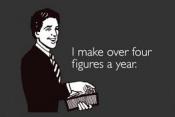 |
|

04-11-2009, 12:52 AM
|

Board Regular
Thread Starter
Join Date: Jan 2007
Location: Western PA
Posts: 404
Mentioned: 0 Post(s)
Tagged: 0 Thread(s)
|
 After your truck is paid off....
After your truck is paid off....
To my understanding, till your truck is paid off, you can claim your monthly truck payments as an expense on your tax returns, and to that extent your tax burden is decreased. But what happens after your truck is paid off, and you can no longer claim your truck payments as an expense ? Do you end up paying more taxes ? Would it, in that case, make more sense to buy a new truck to claim the tax deduction on truck payments, and not pay higher taxes ?
Basically, at the end of the day, which of these scenarios would leave you with a higher take-home, everything else being equal ?
|


04-11-2009, 01:08 AM
|

Senior Board Member
Join Date: Jun 2004
Location: Chicago, IL
Posts: 3,800
Mentioned: 0 Post(s)
Tagged: 0 Thread(s)
Mentioned: 0 Post(s)
Tagged: 0 Thread(s)
|
You can also write off your interest on it as well. I know a few o/o's that buy new trucks every 2 years for the tax advantage. A good, paid-for truck isn't a bad way either. However, if you buy new trucks, you'll always have new equipment. Statistically, I'm sure new trucks break down a LOT less, but you still can have probelm child trucks that come off the assembly line.
The other option is start adding chicken lights and chrome when the truck not is paid to alleviate your tax burden.
__________________
Mud, sweat, and gears
|

04-11-2009, 01:19 AM
|

Rookie
Join Date: Apr 2009
Location: Visalia, CA
Posts: 22
Mentioned: 0 Post(s)
Tagged: 0 Thread(s)
Mentioned: 0 Post(s)
Tagged: 0 Thread(s)
Mentioned: 0 Post(s)
Tagged: 0 Thread(s)
|
Quote:
Originally Posted by Graymist

Basically, at the end of the day, which of these scenarios would leave you with a higher take-home, everything else being equal ?
|
I think you would have to run some different tax scenarios based on your actual current tax situation to determine what is best for you. For example, if you are making $24K a year in pasyments and you don't save $24K a year in taxes, was it worth it. You have to compare taxes with and without the payment while still considering your other expenses. Fuel for example will be needed regardless of the truck. More maintenance may be required on the older truck.
You have to determine how it works out for you. If you have turbo tax you could run some different scnarios to help decide.
__________________
LostSoul
Visalia, CA
|

04-11-2009, 02:15 AM
|

Administrator
Site Admin
Board Icon
Join Date: Feb 2005
Location: Tennessee
Posts: 17,097
Mentioned: 0 Post(s)
Tagged: 0 Thread(s)
Mentioned: 0 Post(s)
Tagged: 0 Thread(s)
Mentioned: 0 Post(s)
Tagged: 0 Thread(s)
Mentioned: 0 Post(s)
Tagged: 0 Thread(s)
|
Don't worry too much about paying taxes after your truck is paid off. There is always something that needs to be repaired or replaced.
|

04-11-2009, 02:29 AM
|

Senior Board Member
Join Date: Aug 2006
Location: michigan
Posts: 2,777
Mentioned: 0 Post(s)
Tagged: 0 Thread(s)
Mentioned: 0 Post(s)
Tagged: 0 Thread(s)
Mentioned: 0 Post(s)
Tagged: 0 Thread(s)
Mentioned: 0 Post(s)
Tagged: 0 Thread(s)
Mentioned: 0 Post(s)
Tagged: 0 Thread(s)
|
For me I didn't like having a paid off truck. I paid more in taxes and was always fixing something on a 1.3 million mile truck. I decided that it was a wash and if I was still paying in about the same I might as well have a newer truck and payments rather than have breakdowns and miss work.
__________________
" I love college football. It's the only time of year you can walk down the street with a girl in one arm and a blanket in the other, and nobody thinks twice about it." --Duffy Daugherty

|

04-11-2009, 02:29 AM
|

Guest
Board Icon
Join Date: Apr 2006
Location: The other side of the coin
Posts: 9,368
Mentioned: 0 Post(s)
Tagged: 0 Thread(s)
Mentioned: 0 Post(s)
Tagged: 0 Thread(s)
Mentioned: 0 Post(s)
Tagged: 0 Thread(s)
Mentioned: 0 Post(s)
Tagged: 0 Thread(s)
Mentioned: 0 Post(s)
Tagged: 0 Thread(s)
Mentioned: 0 Post(s)
Tagged: 0 Thread(s)
|
Quote:
Originally Posted by Graymist

To my understanding, till your truck is paid off, you can claim your monthly truck payments as an expense on your tax returns, and to that extent your tax burden is decreased.
|
Yes and no. You can only deduct the actual truck payments if you are leasing the truck. If you purchase the truck, then you depreciate it over three years. There are several ways you can depreciate it; evenly over the three years, higher at the beginning, and less at the end, or vice versa. Once the truck is depreciated, you can only deduct the interest paid on the loan. So if you have a 5 year truck loan, you get the deduction for the first three years, after which you end up with a higher tax bill.
|

04-11-2009, 03:49 AM
|

Senior Board Member
Join Date: Aug 2005
Location: jackassville (winnipeg, mb)
Posts: 3,280
Mentioned: 0 Post(s)
Tagged: 0 Thread(s)
Mentioned: 0 Post(s)
Tagged: 0 Thread(s)
Mentioned: 0 Post(s)
Tagged: 0 Thread(s)
Mentioned: 0 Post(s)
Tagged: 0 Thread(s)
Mentioned: 0 Post(s)
Tagged: 0 Thread(s)
Mentioned: 0 Post(s)
Tagged: 0 Thread(s)
Mentioned: 0 Post(s)
Tagged: 0 Thread(s)
|
Get this in your head:
There are ZERO advantages to writeoffs.
Say for example you "received" $100,000 in income this year. Would you:
1) Keep it and pay ~30% tax, and end up with ~$70k
2) Blow it all on something tax deductible, pay no tax, but end up with no money
It is ALWAYS better having a truck paid off and fully depreciated. At this point, more money is made so more taxes are paid. But in our tax system(bracket system) your tax burden goes up somewhat linearly. In other words it's always a percentage of your income.
I've never understood this "but you need some sort of writeoffs". I'd rather have zero writeoffs and keep all my money, minus a percentage that goes to income tax of course.
|

04-11-2009, 03:59 AM
|

Board Regular
Join Date: Sep 2007
Posts: 414
Mentioned: 0 Post(s)
Tagged: 0 Thread(s)
Mentioned: 0 Post(s)
Tagged: 0 Thread(s)
Mentioned: 0 Post(s)
Tagged: 0 Thread(s)
Mentioned: 0 Post(s)
Tagged: 0 Thread(s)
Mentioned: 0 Post(s)
Tagged: 0 Thread(s)
Mentioned: 0 Post(s)
Tagged: 0 Thread(s)
Mentioned: 0 Post(s)
Tagged: 0 Thread(s)
Mentioned: 0 Post(s)
Tagged: 0 Thread(s)
|
Quote:
Originally Posted by allan5oh

Get this in your head:
There are ZERO advantages to writeoffs.
Say for example you "received" $100,000 in income this year. Would you:
1) Keep it and pay ~30% tax, and end up with ~$70k
2) Blow it all on something tax deductible, pay no tax, but end up with no money
It is ALWAYS better having a truck paid off and fully depreciated. At this point, more money is made so more taxes are paid. But in our tax system(bracket system) your tax burden goes up somewhat linearly. In other words it's always a percentage of your income.
I've never understood this "but you need some sort of writeoffs". I'd rather have zero writeoffs and keep all my money, minus a percentage that goes to income tax of course.
|
He is right, also lower insurance if you carry comp, plus when you aren't running you don't have payments that keep running.
|

04-11-2009, 04:02 AM
|

Senior Board Member
Join Date: Apr 2008
Location: Midwest
Posts: 1,274
Mentioned: 0 Post(s)
Tagged: 0 Thread(s)
Mentioned: 0 Post(s)
Tagged: 0 Thread(s)
Mentioned: 0 Post(s)
Tagged: 0 Thread(s)
Mentioned: 0 Post(s)
Tagged: 0 Thread(s)
Mentioned: 0 Post(s)
Tagged: 0 Thread(s)
Mentioned: 0 Post(s)
Tagged: 0 Thread(s)
Mentioned: 0 Post(s)
Tagged: 0 Thread(s)
Mentioned: 0 Post(s)
Tagged: 0 Thread(s)
Mentioned: 0 Post(s)
Tagged: 0 Thread(s)
|
Actually depreciation is a paper write off so I think it is a better tax advantage to pay off the truck and have the depreciation expense. Not to say it is worth buying a new truck every three years.
|

04-11-2009, 08:41 AM
|

Senior Board Member
Join Date: Jun 2004
Location: Chicago, IL
Posts: 3,800
Mentioned: 0 Post(s)
Tagged: 0 Thread(s)
Mentioned: 0 Post(s)
Tagged: 0 Thread(s)
Mentioned: 0 Post(s)
Tagged: 0 Thread(s)
Mentioned: 0 Post(s)
Tagged: 0 Thread(s)
Mentioned: 0 Post(s)
Tagged: 0 Thread(s)
Mentioned: 0 Post(s)
Tagged: 0 Thread(s)
Mentioned: 0 Post(s)
Tagged: 0 Thread(s)
Mentioned: 0 Post(s)
Tagged: 0 Thread(s)
Mentioned: 0 Post(s)
Tagged: 0 Thread(s)
Mentioned: 0 Post(s)
Tagged: 0 Thread(s)
|
Partially true. When your net income is reaching a break point where tax brackets end/meet, sometimes that chrome visor you can buy that puts you into a LOWER tax bracket is very beneficial. Pretty much what I'm saying is, there are points where you can buy something for you/your truck or pay it to the government.
An example-
Lets say you net 80, and pay 30%. After 24 in tax, you are left with 56.
Lets say you bought those naked lady mudflaps and your net is now 79, but taxed at 27% (assuming <80 grand )and you are left with just over 57,500. You got extra chorme/gadgets, and STILL have more money.
Now, these are rounded numbers, and only examples of tax brackets, but it's pretty easy to see what I'm getting at.
And I believe the term is "exponential" as opposed to linear since the tax rate increases with taxable earnings.
__________________
Mud, sweat, and gears
|
 |
|
|

|

